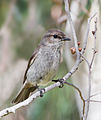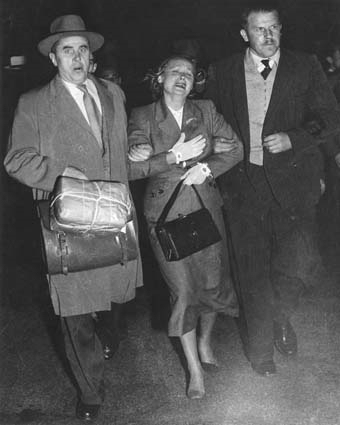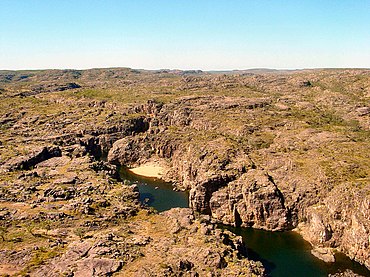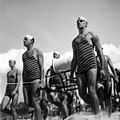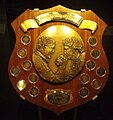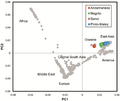Portal:Australia
| Showcase | Content | Interesting facts | Contributing |
Introduction

Australia, officially the Commonwealth of Australia, is a country comprising the mainland of the Australian continent, the island of Tasmania and numerous smaller islands. Australia has a total area of 7,688,287 km2 (2,968,464 sq mi), making it the sixth-largest country in the world and the largest country by area in Oceania. It is the world's oldest, flattest, and driest inhabited continent, with some of the least fertile soils. It is a megadiverse country, and its size gives it a wide variety of landscapes and climates including deserts in the interior and tropical rainforests along the coast.
The ancestors of Aboriginal Australians began arriving from south-east Asia 50,000 to 65,000 years ago, during the last glacial period. They settled on the continent and formed approximately 250 distinct language groups by the time of European settlement, maintaining some of the longest known continuing artistic and religious traditions in the world. Australia's written history commenced with Dutch exploration of most of the coastline in the 17th-century. British colonisation began in 1788 with the establishment of the penal colony of New South Wales. By the mid-19th century, most of the continent had been explored by European settlers and five additional self-governing British colonies were established, each gaining responsible government by 1890. The colonies federated in 1901, forming the Commonwealth of Australia. This continued a process of increasing autonomy from the United Kingdom, highlighted by the Statute of Westminster Adoption Act 1942, and culminating in the Australia Acts of 1986.
Australia is a federal parliamentary democracy and constitutional monarchy comprising six states and ten territories. Its population of more than 28 million is highly urbanised and heavily concentrated on the eastern seaboard. Canberra is the nation's capital, while its most populous cities are Sydney and Melbourne, both with a population of more than 5 million. Australia's culture is diverse, and the country has one of the highest foreign-born populations in the world. It has a highly developed market economy and one of the highest per capita incomes globally. Its abundant natural resources and well-developed international trade relations are crucial to the country's economy. It ranks highly for quality of life, health, education, economic freedom, civil liberties and political rights.
Featured article -
Section 116 of the Constitution of Australia precludes the Commonwealth of Australia (i.e., the federal parliament) from making laws for establishing any religion, imposing any religious observance, or prohibiting the free exercise of any religion. Section 116 also provides that no religious test shall be required as a qualification for any office or public trust under the Commonwealth. The product of a compromise in the pre-Federation constitutional conventions, Section 116 is based on similar provisions in the United States Constitution. However, Section 116 is more narrowly drafted than its US counterpart, and does not preclude the states of Australia from making such laws. (Full article...)
Selected biography -

Sir Frank Macfarlane Burnet OM AK KBE FRS FAA FRSNZ (3 September 1899 – 31 August 1985), usually known as Macfarlane or Mac Burnet, was an Australian virologist known for his contributions to immunology. He won a Nobel Prize in 1960 for predicting acquired immune tolerance. He also developed the theory of clonal selection. (Full article...)
Did you know (auto-generated) -
- ... that in 1919 nurse Hilda Hope McMaugh became the first Australian woman to qualify as a pilot?
- ... that Australian military chaplain Andrew Gillison took up arms to snipe at Turkish soldiers in Gallipoli?
- ... that Australiformis semoni is a parasite that infests marsupials in Australia and New Guinea and whose infestation could cause debilitating ulcerative granulomatous gastritis?
- ... that Edward Thonen, one of the miners killed in the Eureka Rebellion, had gained notoriety in England as a jewellery thief prior to his emigration to Australia?
- ... that in the 1920s, Australian journalist E. George Marks predicted military conflict in the Pacific between Japan and the United States?
- ... that BoysTown was reported as having the largest case of child abuse in Australia's history?
- ... that John Dique constructed the machine used by the first Australian patient to receive dialysis?
- ... that the Scottish Register of Tartans has registered district tartans for Australia as a whole, and also a state district tartan for each of Australia's six states?
In the news
- 30 September 2024 – Australia–Tuvalu relations, Climate change in Tuvalu
- Tuvalu's climate minister denounces the Australian Labor government's decision to expand three coal mines as an existential threat to the nation, due to the role of the mines in causing rising sea levels that have forced mass displacement across Tuvalu's low-lying islands. (The Guardian)
- 28 September 2024 – 2024 AFL premiership season
- The Brisbane Lions defeat the Sydney Swans 120–60 in the Australian Football League Grand Final to win their fourth AFL premiership title. (The Guardian Australia)
- 26 September 2024 – Israel–Hezbollah conflict
- Israel rejects proposals from the United States, Australia, and the European Union to initiate a temporary 21-day ceasefire with Hezbollah. (Reuters) (Reuters 2)
- 23 September 2024 – 2024 AFL season
- In Australian football, Patrick Cripps wins his second Brownlow Medal with 45 votes, the most votes since the current voting system was introduced, and also becomes the seventeenth player to win the award more than once. (ABC News Australia)
- 18 September 2024 –
- Alleged Ghost developer and administrator Jay Je Yoon Jung is arrested in Sydney, Australia, on five charges related to the encrypted communication network's development and operation. (The Register)
Selected pictures -
On this day

- 1920 – The Queensland and Northern Territory Aerial Service, later known as Qantas, is founded.
- 1941 – Actor and comedian Max Gillies is born in Melbourne.
- 1952 – Lang Hancock discovered iron ore deposits in the Pilbara region of Western Australia.
- 2004 – The train Spirit of Townsville from Brisbane, bound for Cairns, is involved in the Rosedale train crash.
- 2005 – Australia qualifies for the 2006 FIFA World Cup.
General images
Topics
More portals
WikiProject
 |
 |
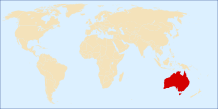
| |
Consider joining WikiProject Australia, a WikiProject dedicated to improving Wikipedia's coverage of topics related to Australia. The project page and its subpages contain suggestions on formatting and style of articles, which can be discussed at the project's notice board. To participate, simply add your name to the project members page.
As of 16 November 2024, there are 205,559 articles within the scope of WikiProject Australia, of which 594 are featured and 885 are good articles. This makes up 2.97% of the articles on Wikipedia, 5.34% of all featured articles and lists, and 2.18% of all good articles (see WP:AUSFG). Including non-article pages, such as talk pages, redirects, categories, etc., there are 526,274 pages in the project.
Associated Wikimedia
The following Wikimedia Foundation sister projects provide more on this subject:
-
Commons
Free media repository -
Wikibooks
Free textbooks and manuals -
Wikidata
Free knowledge base -
Wikinews
Free-content news -
Wikiquote
Collection of quotations -
Wikisource
Free-content library -
Wikiversity
Free learning tools -
Wikivoyage
Free travel guide -
Wiktionary
Dictionary and thesaurus









